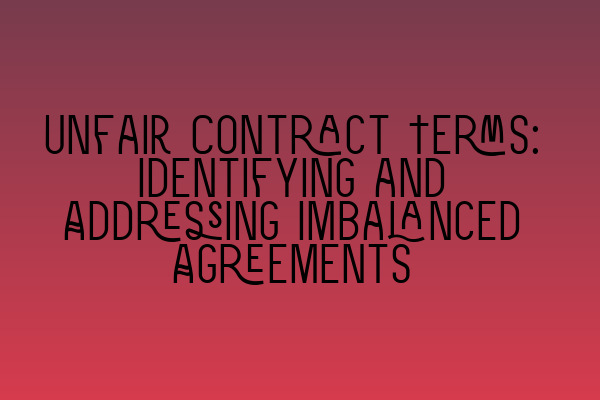Unfair Contract Terms: Identifying and Addressing Imbalanced Agreements
In the world of contract law, it is not uncommon to come across agreements that contain unfair contract terms. These terms can often lead to an imbalance of power between the parties involved, which can have detrimental effects on one party’s rights and obligations. As a solicitor, it is crucial to understand the concept of unfair contract terms and how to identify and address them effectively. In this article, we will explore the key elements of unfair contract terms and provide practical guidance on how to navigate these imbalanced agreements.
What are Unfair Contract Terms?
Unfair contract terms refer to clauses or conditions in contracts that create significant imbalance between the parties. These terms are usually included by the party with more bargaining power and can result in substantial disadvantage or loss for the party with less bargaining power. Unfair contract terms can arise in various types of agreements, including consumer contracts, employment contracts, and business-to-business contracts.
Signs of Unfair Contract Terms
Identifying unfair contract terms requires a thorough analysis of the agreement. Some common indicators of unfairness include:
1. Lack of Transparency: If the terms are unclear, ambiguous, or buried within other provisions, it can indicate an unfair advantage for one party.
2. Unequal Bargaining Power: If one party has significantly more negotiating power than the other party, it may result in unfair terms that favor the stronger party.
3. Excessive Limitations of Liability: Terms that unreasonably limit or exclude liability can be considered unfair, especially if they disproportionately protect one party from responsibility.
4. Unilateral Variation of Terms: Clauses that allow one party to unilaterally change the terms of the agreement without the other party’s consent can be deemed unfair.
Addressing Unfair Contract Terms
Once unfair contract terms have been identified, it is important to take appropriate action to address the imbalance. Here are some steps solicitors can take:
1. Review Legislation and Case Law: Familiarize yourself with relevant legislation, such as the Consumer Rights Act 2015, and case law that relates to unfair contract terms. This understanding will serve as a foundation for your arguments against unfair terms.
2. Negotiation and Amendment: Attempt to negotiate with the other party to amend or remove the unfair terms. Clearly explain the reasons for your concerns and propose alternative, fairer provisions.
3. Litigation or Alternative Dispute Resolution: If negotiation fails, consider pursuing litigation or alternative dispute resolution mechanisms to challenge the unfair terms. Seek guidance from your firm and cite relevant case law to support your arguments.
4. Educate Clients on Their Rights: Ensure that your clients understand their rights and obligations under the contract. Empower them to make informed decisions and provide guidance on how to avoid unfair terms in future agreements.
Conclusion
Identifying and addressing unfair contract terms is an essential aspect of contract law practice. By being vigilant and knowledgeable about the signs of unfairness, solicitors can effectively protect their clients’ interests and promote fairness in contractual relationships. Remember to familiarize yourself with relevant legislation and case law, negotiate for fairer terms, and be prepared to pursue litigation or alternative dispute resolution if necessary. Together, we can create a more equitable and just legal landscape.
Related Articles:
– Unveiling Real-Life Case Studies: Insights into Legal Practice and Decision-Making
– Exploring Solicitor Salaries in the UK: Average Earnings and Factors Affecting Income
– Mastering Client Relationship Management: Skills for Solicitors to Enhance Trust and Loyalty
– Pursuing a Law School Education in the UK: Choosing the Right Path for Your Future
– Securing Training Contracts: A Roadmap to Becoming a Solicitor
